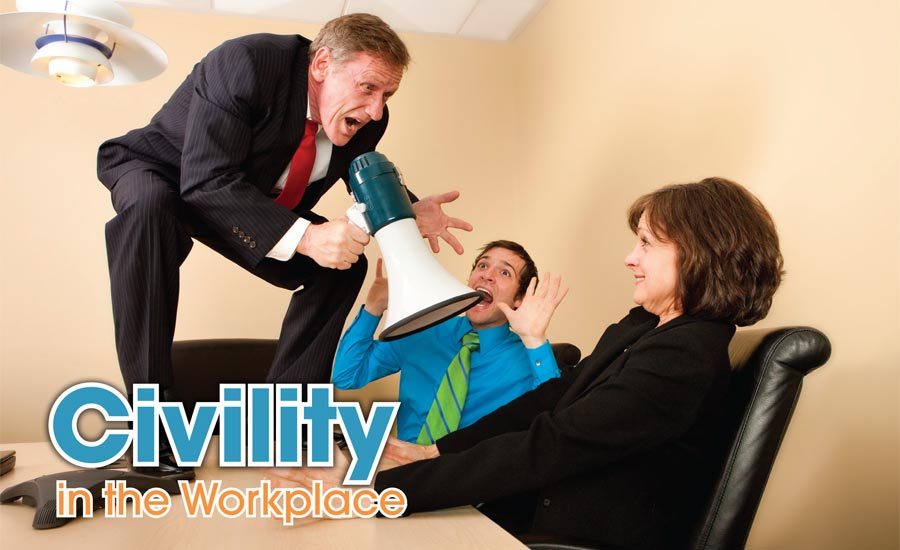Civility in the Workplace






We’ve all walked into a retail store or restaurant and witnessed a manager boorishly yelling at an employee over a mistake. If you are like me, your gut reaction is to walk out the front door and never return. My perception is if that’s how they treat their own, that is how they’ll treat me. Workplace incivility is becoming an epidemic, and the restoration industry is not immune.
Anybody with half a brain knows you should never scream at or show up an employee, even behind closed doors. But how are other types of incivility affecting our companies—the ones that manifest from a lack of consideration or common decency? When did the desire to be respectful and courteous disappear? Why has it become commonplace to argue with coworkers over hot-button social and political beliefs? How does this affect the performance and profitability of our restoration businesses?
Civility is formal politeness and courtesy in behavior and speech. Some may call this political correctness, but there is a significant difference. Political correctness, a hot-button topic itself, is the deliberate act of trying not to be insensitive to others. The goal of civility is to purposely show respect and to work toward a healthy, cohesive atmosphere. It’s about being self-aware enough to do the little things right, even when no one is watching. If we miss the garbage can, walk over and pick up our trash. If we drink the last bit of coffee, ask to see if others still want some and make another pot. When someone is talking to us, look them in the eye instead of focusing on our computer screen or phone.
What caused this noticeable decline in how we treat others in the office or on the jobsite? It appears to be a combination of factors that have resulted from our modern environment. First, the rise of work-from-home positions where most communicating is done through tools like email, Skype, and texting which eliminate human interaction. When we don’t have a need to be civil as often, we forget it’s importance. Incivility also increases during times of heavy stress or high workload, both staples in restoration, especially after a big storm.
Social media is another contributor. During and after the election, use of Facebook and Twitter became a cyber-bullying nightmare. “Keyboard muscles” give the fictitious idea that we have the right to defend our beliefs by insulting others. This has carried over to traditional interactions. There is also an old-school/new-school debate going on regarding the discussion of such topics. Decades of “never talk politics and religion in the workplace” is being replaced by a new generation of workers who have been raised with the understanding that we should always be who we are and “bring our whole self to the workplace.” We are inundated with loud, often rude opinions from 24-hour news channels, celebrities and sports figures weighing in, and websites from both sides of the aisle telling us to go out and fight for our beliefs. When we start to believe this “it’s all about me and what I want” mentality, even in the workplace, little things like not replacing the expired roll of toilet paper in the company restroom because we’re uncommonly busy, or just don’t feel like it, take root.
The Cost of Incivility
Incivility, whether clear and overt like verbally abusing a coworker or not bothering to clean and organize the work van at the end of the day, has real costs. A recent study by Harvard Business Review among workers who’ve consistently been on the receiving end of incivility reported:
- 48% intentionally decreased their work efforts
- 47% intentionally decreased their time spent at work
- 80% lost work time worrying about the incidents
- 78% said their commitment to the organization declined
But the most painful statistic is that 25% admitted to taking their frustrations out on customers. Of people who confessed to engaging in incivility at work, 25% of those cited a manager or company leader not being polite and courteous to them as their reason for feeling it was acceptable to exhibit the same rudeness to others. It’s not just children who mimic the behavior of authority figures; it is innate in all of us. People see; people do. Especially if we have never received training in proper stress management or conflict resolution. When incivility manifests at the top, it filters all the way down to our customers.
Workplace civility doesn’t just happen. It is the result, and responsibility, of everyone in the company making a concerted effort. Have we identified our company’s core values? Is civility one of them? Do we meet regularly with our team to reaffirm its importance, gain their buy-in, and follow through to make sure everyone participates? Do we bring direct attention to someone who fails to act with civility?
Create a Civil Code of Behavior
Mutual respect and creating a code of civil behavior can be done through the following:
- Common Ground – Communicate the expectation that employees stay focused on the reason we are in business: to serve those affected by a disaster. It is vital that everyone in the company knows we are to treat each other with the utmost respect, because we are in this together. The actions of the owner are the starting point.
- Acknowledgement – When passing other team members, acknowledge their presence. It can be as simple as a smile or a wave.
- Hold Doors – Small kindnesses make the biggest difference and set the tone.
- Speak Civilly – Keep things professional. Never allow a professional debate to get personal and never enter into a non-professional debate at work. Always use a measured voice. Don’t forget the power of “please” and “thank you.”
- Clean Up – It’s simple. If we make a mess, clean it up. If there is something left on a table after a meeting, take the initiative to put it where it belongs. Others will notice and follow our actions. Owners, want to make a lasting impression? Let your employees see you sweeping the floor or shoveling snow from the entrance to the office.
- The Platinum Rule – Instead of treating others how we want to be treated, treat them how they want to be treated. It’s the easiest way to earn their respect.
Communication and proper body language is important when it comes to civility. One of the most powerful ways to interpret how we appear to others is by videotaping several of our interactions. We may be amazed at what we see! Involuntary slights are commonplace. We should try watching the video with no sound to gauge our body language. Do we come across as someone we would want to talk to? Now listen to the recording without the picture. Pay attention to the words we say and the inflection in our voice. Are we expressing our words professionally and respectfully?
The new dangerous trend in incivility is owners and employees feeling it is acceptable to express their political beliefs in the workplace and force their opinions on others. Topics like abortion, immigration, same-sex marriage, and healthcare inspire passionate debate and deeply personal beliefs. For our country, that is a positive. For our businesses, it can be devastating. Recently, a man who has volunteered for several national presidential campaigns made a blatantly distasteful remark on Twitter about a widow whose husband was a Navy SEAL killed in the line of duty. People researched where he was employed and began contacting the company to express their displeasure. His employer chose to fire him immediately, stating that his comments did not reflect the culture or beliefs of the company; comments that were made on a private Twitter account, off company time.
As a Violand Management employee, if I express an opinion that current or potential clients hear, are offended by, and choose to never work with our company because of, I deserve to lose my job—regardless of whether it was expressed during or after work. But many people believe employees have a constitutional right to discuss politics at work and what we say off the clock cannot affect our employment status. That is wrong. The First Amendment applies only to government actions and does not limit the rights of private employers to regulate employees’ communication, nor does it provide a constitutional right for employees to express our opinions at work. In short, there is no constitutionally protected free speech for saying controversial things in offices or job sites of private restoration companies.
When Things Get Tricky
Company owners may feel they have earned the right to speak their mind. Their name appears on the paycheck and if we don’t like it, so what? Besides the obvious fact of potentially creating a hostile work environment or scaring off top talent, as an owner, if you become political in the workplace, you will eventually harm your employees. If the owner of the company where I am employed made controversial political statements at an industry event, people who have opposing views might choose to take their business elsewhere. If this happened, as a commissioned employee I would feel a direct impact on my compensation. Since I couldn’t fire him, I would then have to choose whether to leave the company or to stay and work with a smaller pool of potential clients. What impact could an owner or employee publicly making potentially upsetting statements have on your company? Many companies over the last decade have been hit with harmful boycotts that hurt sales. The airline industry is currently going through a public perception meltdown. And frontline employees are often the first to be let go when revenues decrease.
Political discussions at work are extremely tricky. The simple solution would be not to engage—period. But the reality is that it’s impossible to stop discussions completely. Every expert on different generations in the workplace will tell us that millennials expect access to their phones and social media while at work. Nowadays, almost all of us do, regardless of our generation. Through constant use of sites such as Facebook, Instagram, and Snapchat, we are being bombarded with politics, which will inevitably carry over into everyday discussions. Eliminating access to our phones likely means losing stars in our companies.
Solutions
So, what can we do? Start by implementing a clear policy on eliminating political activity. Make sure this policy has exceptions that comply with both the National Labor Relations Act and local state laws, as there are specific workplace discussions concerning employment-related issues that are permitted by law. Communicate this policy with employees, along with the consequences of not following the rules. Be sure these consequences are firm, fair, and consistent regardless of the offending person’s role in the company or our agreement or disagreement with what they said or did. Directly discourage any supervisors or managers from having political conversations with subordinates to limit potential claims of harassment or bullying. Finally, schedule and carry out reminders to the entire staff about the policy. We recommend doing this during quarterly business planning reviews.
Everyday manners matter. Being aware of the feelings of those around us and purposely making the effort to be courteous and polite goes far in creating a healthy company culture. It starts at the top. Encourage employees to let us know when we fall short. In business, and in life, we can choose to be a lot of things. At Violand Management, it is recommended that we all choose to be kind.
Looking for a reprint of this article?
From high-res PDFs to custom plaques, order your copy today!








